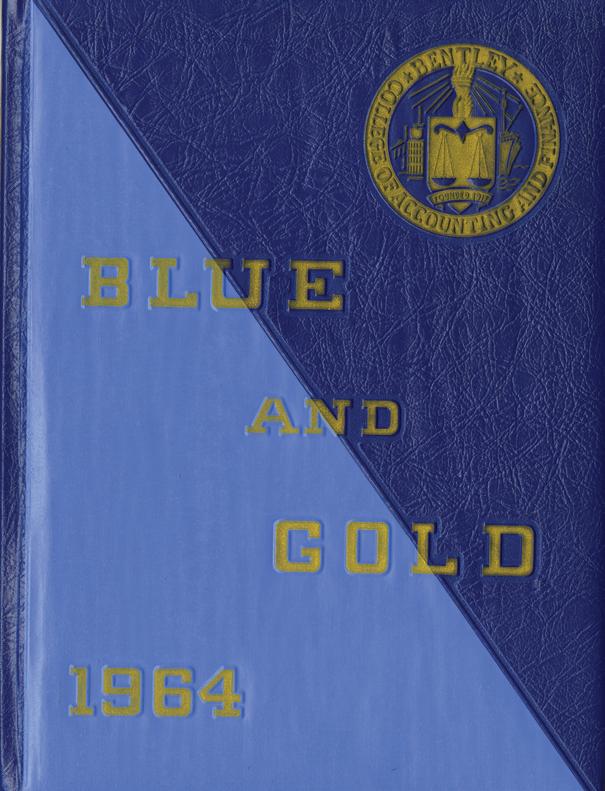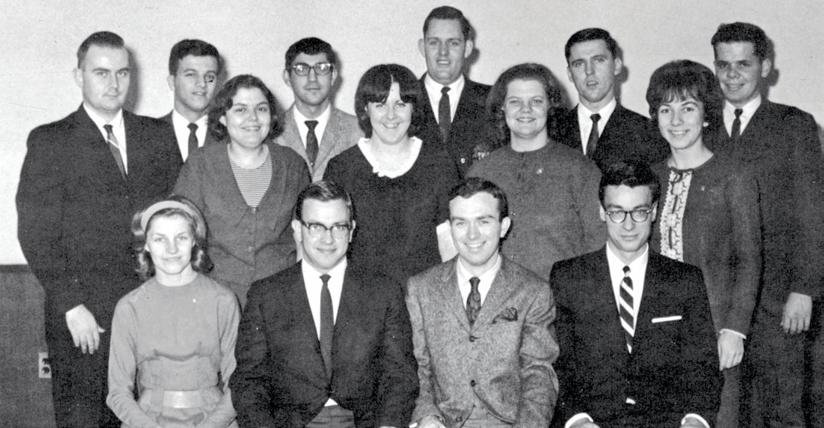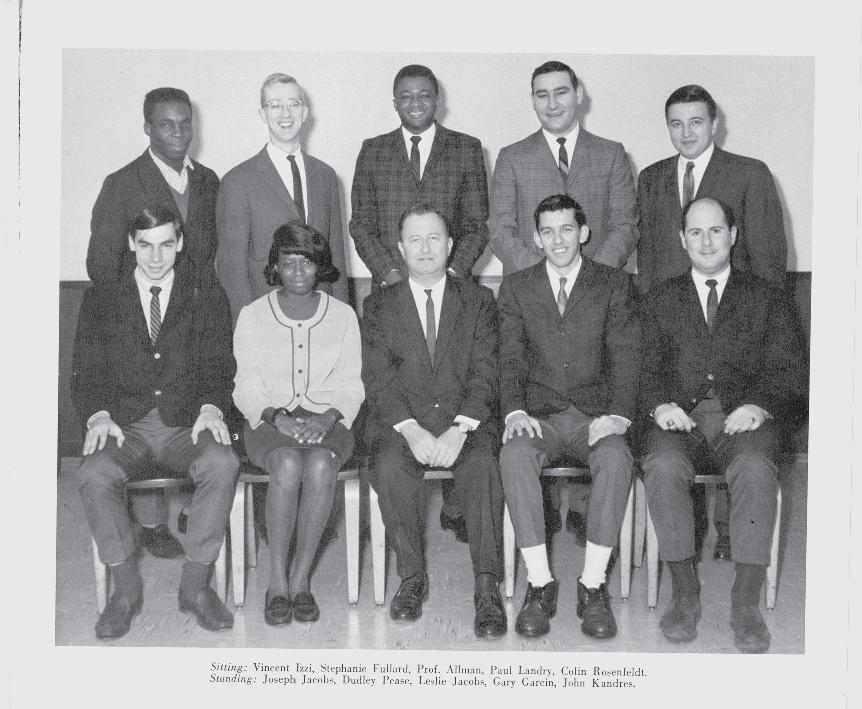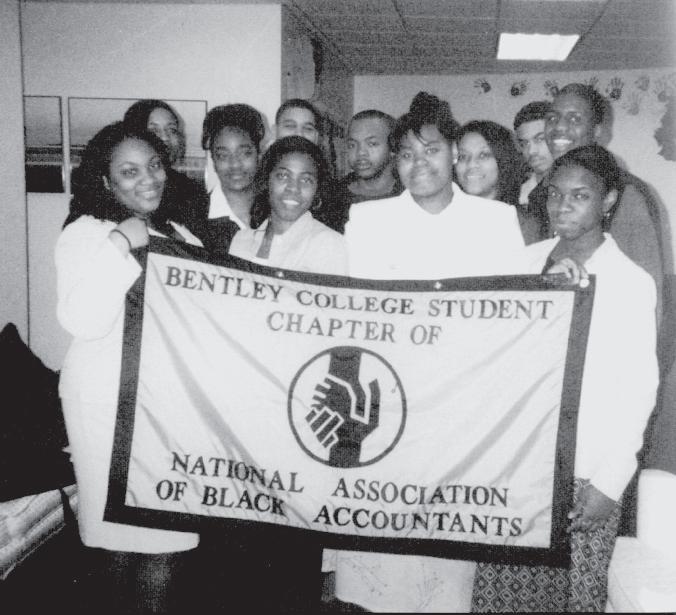
8 minute read
From the President
PRESIDENT FROM THE
One of my favorite activities as president is traveling to see frsthand the impact our alumni are having around the world. In the last few months, I’ve enjoyed visits with alumni in Kuwait, the Philippines, Japan, Greece, Spain and the U.K. I’m grateful for their hospitality in making my visits memorable, and I am continually amazed at the reach and impact of a Bentley education. Yet as student populations, jobs and career paths change, it’s important that business educators change, too. With new resources on campus like our recently launched Badavas Center for Innovation in Teaching and Learning, I’m proud to say that Bentley continues to evolve to meet the needs of tomorrow’s students.
Advertisement
In this issue, you’ll read about entrepreneurs whose vision and courage allowed them to identify a market need and create a solution. Like any good entrepreneur, Bentley continues to adapt to keep up with — and stay ahead of — the needs of the marketplace.
Over the past year, we’ve developed a strategic plan that will make sure Bentley continues to be a leader in business education well into our second century. With valuable input from our entire community, and unanimous approval by the Board of Trustees, we’re proud to unveil Strategic Plan 2020-2025, our framework to reinvent both

what we teach students and how we teach it. With a Bentley education, our students won’t just understand the business world, they’ll help shape it.
In today’s competitive world, it’s not enough for colleges and universities to simply have the standard set of tools to educate tomorrow’s leaders. Instead, educators need to adopt that same entrepreneurial spirit you’ll see highlighted in this issue — the ability to continuously innovate when it comes to creating and delivering academic programs and oferings. After all, we’ve been reinventing business education for over a century. When Harry C. Bentley opened his school in 1917, he did so in the spirit of innovation, by addressing a market need for skilled accountants. Today, we’re keeping that spirit alive by identifying what tomorrow’s world will demand and preparing our students accordingly. Empowered by a Bentley education, there’s no limit to the impact they will make in the U.S. and around the world.
Bentley Elects New Trustees
BY KEVIN WONG
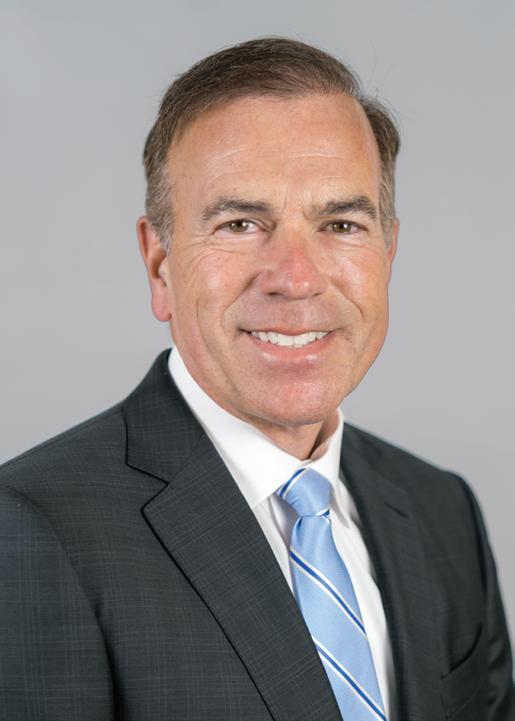
Te Board of Trustees has elected two new members, expanding skill sets and perspectives within the governing body. Gordon A. Pulsifer ’80, P ’08 ’19 and Caryn Beck-Dudley, JD join the board as Bentley enters the new decade and begins launching initiatives in support of its new strategic plan.
Pulsifer has worked in the real estate industry for close to four decades. He is founder, president and CEO of First Resource Companies, a real estate development and management investment frm based in Hanover, Mass. A member of the Class of 1980, he holds a BS in Accountancy and is a certifed public accountant. His sons, Brenton and Michael, earned Bentley degrees in 2008 and 2019, respectively.
Beck-Dudley brings extensive experience leading
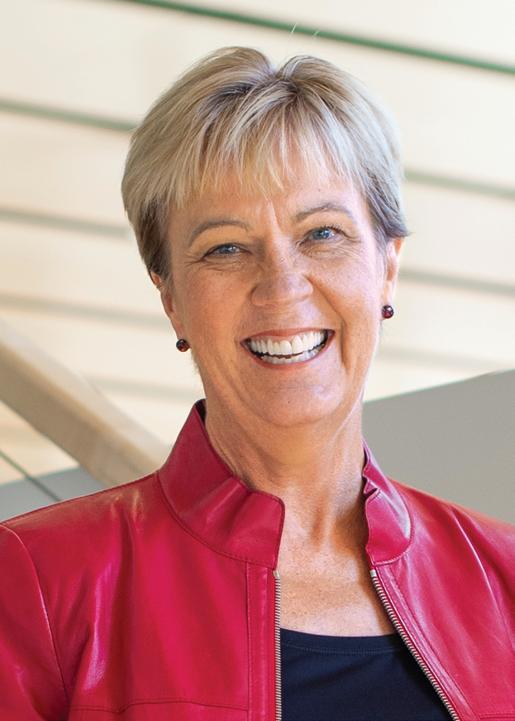
business programs at schools including Florida State and Utah State universities. In her current post, dean of the Leavey School of Business at Santa Clara University, she engages the community to implement strategic initiatives. Beck-Dudley holds a bachelor’s degree in Political Science from Utah State University and received her JD from the University of Idaho College of Law.
“I’m glad to have Gordon and Caryn join us and look forward to the fresh outlook they’ll bring to our decision-making process,” says board chair J. Paul Condrin ’83, P ’19 ’22. “Teir addition comes at an important time for Bentley, as we continue to position the university as a leader in transformative business education.”
Pulsifer and Beck-Dudley will serve three-year terms and can be re-elected.
BY KRISTIN LIVINGSTON
Steven ’73 and Christine (Smith) ’73 Manfredi, P ’10, who have made signifcant gifts to Bentley through the years, have committed $1.5 million to create the Finish Line Grant Fund. It will award scholarships ranging from $5,000 to $30,000 to undergraduates who encounter fnancial hardship on their way to completing their degree. “It can be difcult for some students to get over the fnish line with funding their education,” says Steve, a trustee emeritus whose 13 years of service include chairing the board from 2012 to 2018. “Chris and I want to help students with fnancial challenges that could potentially disrupt their academic career. For every dollar we prevent a student from borrowing, we make it easier for that student long term.”
In addition to lessening the debt burden for students and ensuring those in good standing can complete their Bentley education, the Finish Line Grant Fund will free up other fnancial aid dollars to help more students in need.
“We know the value of a Bentley education,” says Steve, whose daughter, Laura (Manfredi) Barclay, is a member of the Class of 2010. “With these grants, we are telling students, ‘Don’t stop now — you’re close! Continue to work hard and the opportunities and rewards will follow.’”
“Steve and Chris’s expendable grant fund will impact students in need right away,” says President Alison Davis-Blake. “Te new fund further demonstrates their commitment to our school and its students, from their frst year through graduation.” Te Manfredis have been generous
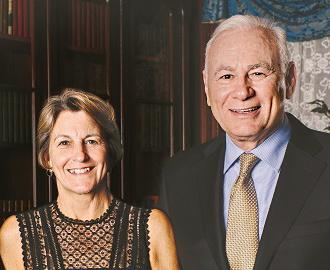
Bentley supporters for decades. Tey were founding donors of the Gloria Cordes Larson Center for Women and Business and among the frst cohort of Great Benefactors, donors whose lifetime gift commitments to Bentley total $1 million or more.
“Less debt will provide students a measure of relief, allowing them to focus on what they need to do to launch a successful career,” says Steve. “Hopefully, that student will someday be in a position to pass it on.”
SPEAKING IN HARMONY
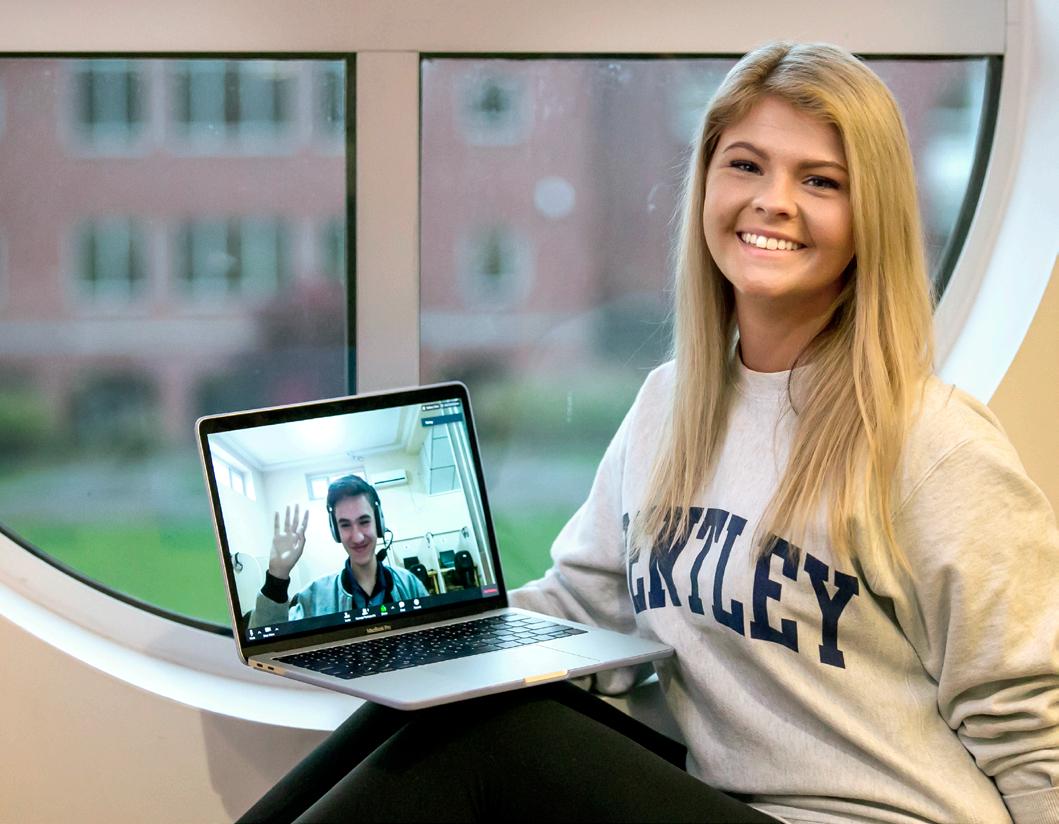
BY KRISTEN WALSH
An online English tutoring program by Bentley students for students in Afghanistan ofers more than language lessons; it promotes peace in a country at war. Robert McNulty, director of programs for Bentley’s Hofman Center for Business Ethics, launched the program Pax Populi (Latin for “the People’s Peace”) in 2009.
Learning English, he says, opens opportunities for Afghans
PHOTOS (TOP) BY TASLIM SIDI URNEK AND BY KEVIN MAGUIRE to be part of the global economy. “If you are poor and don’t have a voice, you are very susceptible to extremism. If you have a good job, perhaps you preserve that security by buying a home and raising a family. Tat is where education can be very helpful.” Te Bentley Service-Learning and Civic Engagement Center coordinates student tutors, who use video conferencing to teach Afghan students like Haroon Ehsan.
“Our discussions helped me open my mind to new ideas, cultures and beliefs,” says Ehsan, who enrolled in Pax Populi at age 15. Te education goes both ways. Bentley tutor Jacob Kalish ’20 had expected cultural diferences to overshadow the tutor-student relationship.
“I could not have been more wrong. After breaking down the surface-level barriers, we are all just people made of the same stuf,” says Kalish, who is now studying for an MS in Finance.
“It’s easy to forget what a blessing it is to pursue higher education,” adds fellow tutor Mary Sullivan ’22 (left), a Public Policy major. “Trough Pax Populi, I’ve grown more grateful and also recognized a passion for social justice.” Te program prompted Ehsan to “set higher goals” for himself. Instead of following the traditional path of working after high school to help support his family, he is studying politics at the American University of Central Asia.
“I learned there are people who genuinely care about my country and want to help us, despite my people’s terrible experiences with exploitation by outsiders,” he says. “It gave me hope.”
THE FALCON FILES BY JAIMIE FRITZ, UNIVERSITY ARCHIVIST
1.
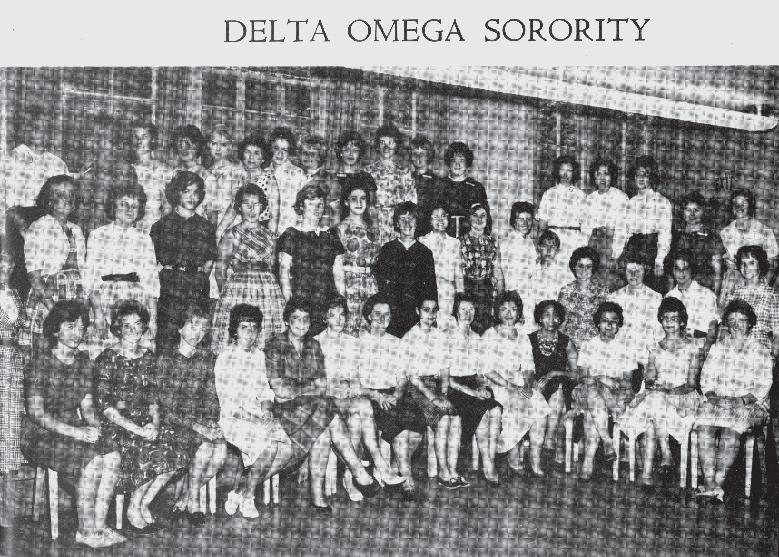
2.
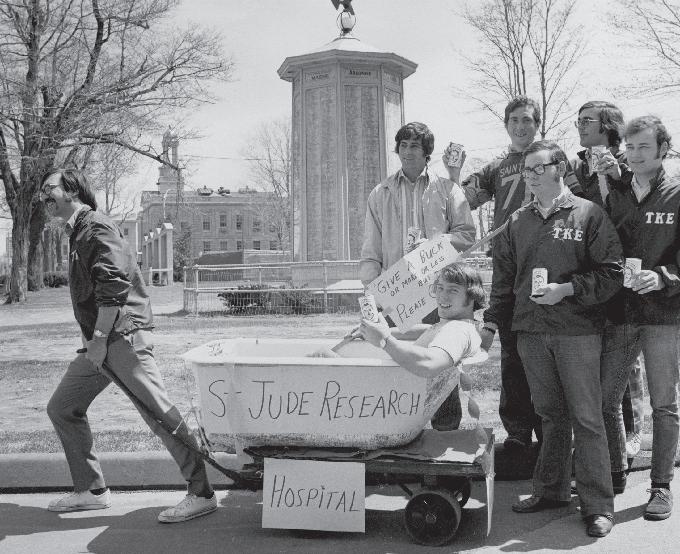
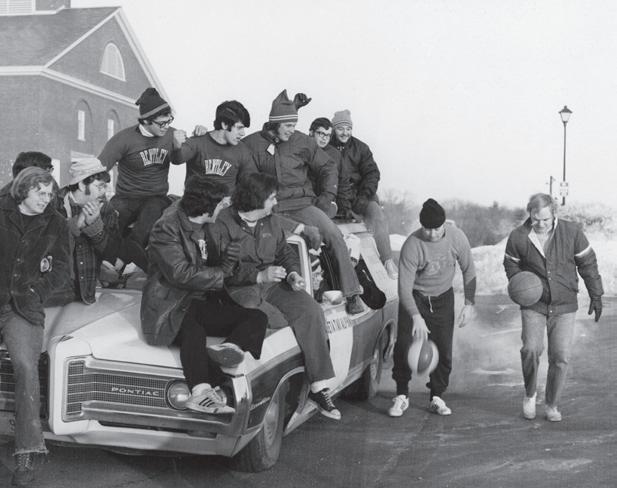
3.
Organized Over Time
Te frst Bentley student organizations were fraternities: Both Kappa Pi Alpha and Beta Tau Alpha established chapters in 1922. Te proliferation slowed in the 1940s, when male enrollment declined because of World War II. Female students in the Day Division created the frst sorority — Delta Omega — in 1944. (1)
Greek organizations gained a reputation for creative fundraising: n A “tub pull” by Tau Kappa Epsilon members in the early 1970s ferried a willing volunteer through downtown Waltham to beneft St. Jude Children’s Research Hospital. (2) n In 1972, members of Beta Tau Alpha took turns dribbling a basketball from Waltham to Worcester to raise money for charity. (3)
Te Newman Club was Bentley’s frst spiritual organization, established in 1962. Early members included several Catholic nuns, who attended Bentley to learn to manage the fnances of their parishes and convents. (4)
Publishing on campus blossomed in the early 1960s. Students launched a yearbook in 1961, known variously as Te Vale and Blue and Gold. Te student newspaper started around the same time (1960) and has been called Te Bentley News, Te Gadfy, Te Inferno and, now, Te Vanguard. (5) Te International Relations Club began in 1967 and included several non-U.S. students attending Bentley. Today’s much-larger population of international students has inspired groups celebrating African American, Brazilian, Caribbean, Chinese, Indonesian, Italian, Korean, Latino, South Asian and Vietnamese cultures, among others. (6)
In 1998, the campus chapter of the National Association of Black Accountants organized the frst Bentley Business Bowl, now a major annual event here. Te association provides career and networking opportunities for students of color. (7)
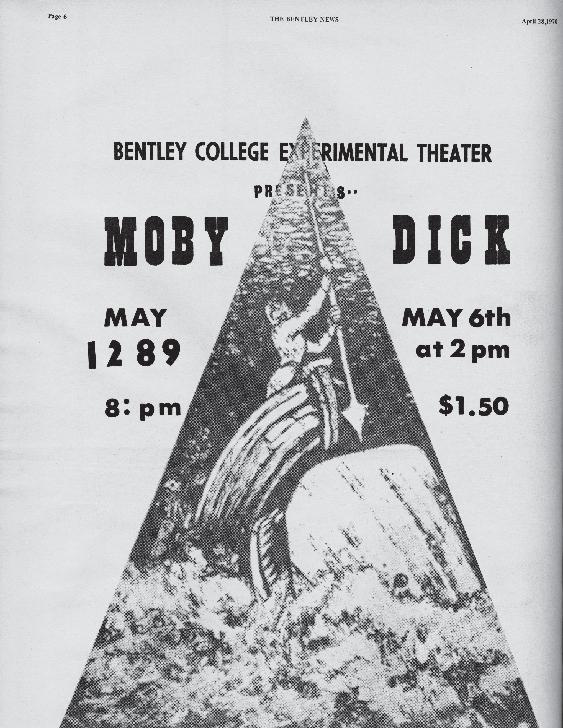
What began as the Bentley Drama Club in the 1960s is now a chapter of national theater honor society Alpha Psi Omega, whose members have been entertaining the campus community for decades. Less well-known is the Experimental Teater Club, which put on avant-garde dramatic productions in the 1970s. (8)
4.
